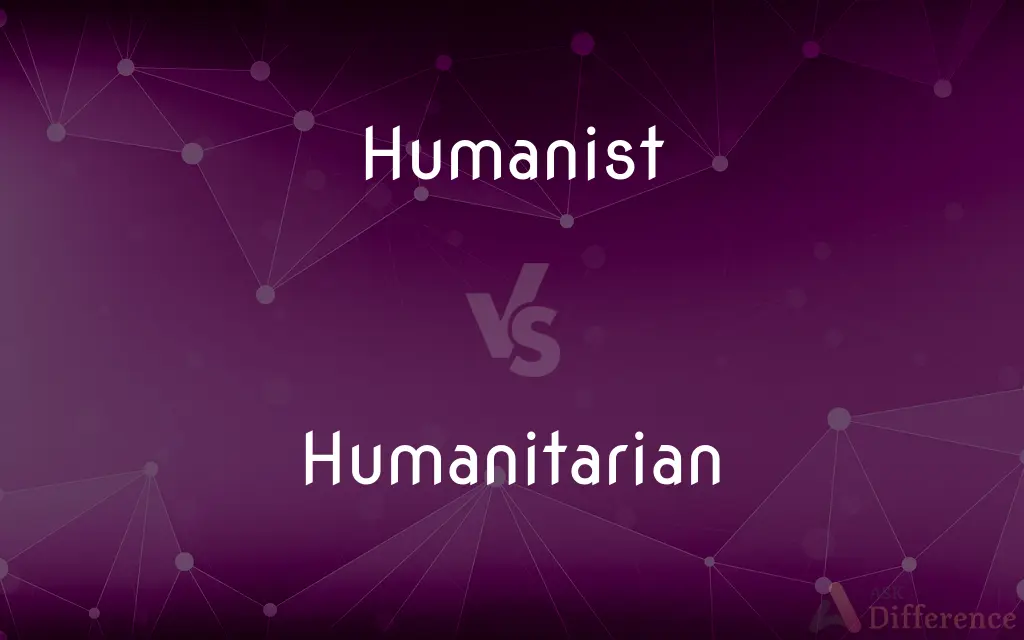Humanist vs. Humanitarian — What's the Difference?
Edited by Tayyaba Rehman — By Urooj Arif — Updated on March 31, 2024
Humanists focus on human values and secular philosophies, while Humanitarians prioritize alleviating human suffering through direct aid.

Difference Between Humanist and Humanitarian
Table of Contents
ADVERTISEMENT
Key Differences
Humanism emphasizes the value and agency of human beings, individually and collectively, often rejecting religious beliefs in favor of reason, ethics, and justice. Humanists seek to understand human needs through philosophy, arts, and sciences, believing in the potential for human improvement and cultural advancement. On the other hand, Humanitarianism is driven by the goal of promoting welfare and alleviating suffering, focusing on practical assistance and empathy towards those in need. Humanitarians often work in non-governmental organizations, providing aid and support during crises and natural disasters.
While humanists often engage in debates, education, and advocacy to promote secular and ethical life stances, emphasizing the importance of human dignity and freedom, humanitarians are more likely to be found on the front lines of global crises. They deliver food, medical aid, and assistance to those affected by wars, famines, and natural calamities, prioritizing immediate relief over philosophical discourse.
Humanism, with its deep roots in Renaissance thinking, advocates for a broad education system that encompasses a wide range of human knowledge, from literature to science, aiming to foster a well-rounded individual. Whereas humanitarian efforts are not bound by any specific educational or philosophical framework but are driven by the practical necessities of emergency response and long-term development aid.
Humanists might stress the importance of critical thinking and moral decision-making based on human reason and evidence, often in opposition to authority or traditional beliefs seen as irrational or oppressive. In contrast, humanitarians, while they may also value these principles, are primarily motivated by compassion and the urgent need to address human suffering, regardless of the ideological or religious background of those in need.
The distinction also lies in the scale and scope of their concerns; humanists are typically involved in the pursuit of knowledge and the promotion of secular ethics as a foundation for improving society at large. Humanitarians, meanwhile, are focused on the immediate, tangible needs of people suffering due to crises, advocating for and implementing solutions that alleviate pain and hardship.
ADVERTISEMENT
Comparison Chart
Focus
Human values and secular philosophies
Alleviating human suffering
Activities
Debates, education, advocacy
Providing aid, emergency response
Basis
Reason, ethics, cultural advancement
Compassion, practical assistance
Historical roots
Renaissance thinking
Emerged prominently in response to crises
Primary motivation
Improvement and dignity of humanity
Immediate relief and support during crises
Compare with Definitions
Humanist
A person who advocates for the principles of humanism, emphasizing human values and the importance of human reason and ethics.
The humanist believed in fostering a culture that values science and rationality over superstition.
Humanitarian
A person who seeks to promote human welfare, often through philanthropic activities.
The humanitarian dedicated her life to providing medical care in war-torn regions.
Humanist
Someone who studies the humanities, including literature, history, art, music, and philosophy.
As a humanist, she spent years studying ancient texts to understand human culture.
Humanitarian
Someone who advocates for human rights and the provision of aid to those in need.
As a humanitarian, he campaigned tirelessly for access to clean water for all communities.
Humanist
A person who prioritizes human dignity and the development of individual potential.
The conference attracted humanists interested in ethical discussions about technology's role in society.
Humanitarian
An advocate for compassionate treatment of all human beings, especially the most vulnerable.
The humanitarian's efforts focused on protecting children affected by the conflict.
Humanist
An individual who believes in the potential for human progress and cultural advancement without reliance on religious doctrines.
His humanist viewpoint led him to support secular education systems.
Humanitarian
A person engaged in actions aimed at improving the health, safety, and well-being of people in crisis.
Humanitarians organized a massive food distribution drive in the famine-struck area.
Humanist
A practitioner of humanism as a philosophical stance, focusing on human-centric solutions.
The humanist argued for policies that prioritized people's well-being over economic gain.
Humanitarian
An individual involved in or supporting efforts to relieve suffering and maintain human dignity.
After the earthquake, humanitarians from around the world came to assist in the recovery effort.
Humanist
A believer in the principles of humanism.
Humanitarian
Concerned with or seeking to promote human welfare
Groups sending humanitarian aid
Humanist
One who is concerned with the interests and welfare of humans.
Humanitarian
A person who seeks to promote human welfare.
Humanist
A classical scholar.
Humanitarian
One who is devoted to the promotion of human welfare and the advancement of social reforms.
Humanist
A student of the humanities.
Humanitarian
Showing concern for the welfare of humanity, especially in acting to improve the living conditions of impoverished people.
Humanist
Humanist A Renaissance scholar devoted to Humanism.
Humanitarian
Being a situation in which many human lives are in danger of harm or death
The drought caused a humanitarian crisis.
Humanist
A scholar of one of the subjects in the humanities.
Humanitarian
Concerned with people's welfare, and the alleviation of suffering; compassionate, humane.
Humanist
A person who believes in the philosophy of humanism.
Humanitarian
Of or pertaining to the belief that Jesus Christ is fully human and not divine.
Humanist
(historical) In the Renaissance, a scholar of Greek and Roman classics.
Humanitarian
Synonym of humanist
Humanist
Relating to humanism or the humanities.
Humanitarian
A person concerned with people's welfare; a do-gooder or philanthropist.
Humanist
(typography) Of a typeface: resembling classical handwritten monumental Roman letters rather than the 19th-century grotesque typefaces.
Humanitarian
One who believes that Jesus Christ is fully human and not divine.
Humanist
One of the scholars who in the field of literature proper represented the movement of the Renaissance, and early in the 16th century adopted the name Humanist as their distinctive title.
Humanitarian
Synonym of humanist
Humanist
One who pursues the study of the humanities, or polite literature.
Humanitarian
Pertaining to humanitarians, or to humanitarianism; as, a humanitarian view of Christ's nature.
Humanist
One versed in knowledge of human nature.
Humanitarian
Content with right affections and actions toward man; ethical, as distinguished from religious; believing in the perfectibility of man's nature without supernatural aid.
Humanist
A person with a strong concern for human welfare, especially one who emphasizes the dignity and worth of individual people, rejecting claims of supernatural influences on humans, and stressing the need for people to achieve improvement of society and self-fulfillment through reason and to develop human-oriented ethical values without theism; an adherent of humanism.
Humanitarian
Benevolent; philanthropic.
Humanist
A classical scholar or student of the liberal arts
Humanitarian
One who denies the divinity of Christ, and believes him to have been merely human.
Humanist
An advocate of the principles of humanism
Humanitarian
One who limits the sphere of duties to human relations and affections, to the exclusion or disparagement of the religious or spiritual.
Humanist
Of or pertaining to Renaissance humanism;
The humanistic revival of learning
Humanitarian
One who is actively concerned in promoting the welfare of humans and human societies; a philanthropist.
Humanist
Of or pertaining to a philosophy asserting human dignity and man's capacity for fulfillment through reason and scientific method and often rejecting religion;
The humanist belief in continuous emergent evolution
Humanitarian
Someone devoted to the promotion of human welfare and to social reforms
Humanist
Pertaining to or concerned with the humanities;
Humanistic studies
A humane education
Humanitarian
Marked by humanistic values and devotion to human welfare;
A humane physician
Released the prisoner for humanitarian reasons
Respect and humanistic regard for all members of our species
Humanist
Marked by humanistic values and devotion to human welfare;
A humane physician
Released the prisoner for humanitarian reasons
Respect and humanistic regard for all members of our species
Humanitarian
Of or relating to or characteristic of humanitarianism;
Humanitarian aid
Common Curiosities
Can someone be both a Humanist and a Humanitarian?
Yes, an individual can embody both philosophies, advocating for human values and reason while actively working to alleviate human suffering.
What is Humanism?
Humanism is a philosophical and ethical stance that emphasizes the value and agency of human beings, individually and collectively, and generally prefers critical thinking and evidence over acceptance of dogma or superstition.
What is Humanitarianism?
Humanitarianism is a moral of kindness, benevolence, and sympathy extended universally and impartially to all human beings, focusing on the prevention and relief of human suffering.
How do Humanists contribute to society?
Humanists contribute to society by promoting education, ethical living, cultural advancement, and the critical examination of beliefs and traditions.
What role do Humanitarians play in emergencies?
In emergencies, Humanitarians provide critical assistance including medical care, food, shelter, and support for recovery and rebuilding efforts.
What drives Humanitarians to help others?
Humanitarians are driven by compassion and a commitment to improve human welfare and alleviate suffering, often in response to crises or disasters.
How do Humanists and Humanitarians view religion?
Humanists often prioritize secular and rational approaches to ethics and society, while Humanitarians might work within both secular and religious frameworks to alleviate suffering.
Why do Humanists value secularism?
Humanists value secularism as it promotes a society based on reason, ethics, and justice without reliance on religious doctrines, allowing for the development of a pluralistic society.
What is the main goal of Humanitarian aid?
The main goal of Humanitarian aid is to save lives, alleviate suffering, and maintain human dignity during and in the aftermath of emergencies.
What ethical principles guide Humanists?
Humanists are guided by principles of reason, ethics, justice, and a commitment to human rights and freedoms.
Do Humanists believe in God?
While humanism is compatible with theism, it typically emphasizes a secular approach to ethics and life, often focusing on human solutions and achievements without recourse to divine intervention.
What challenges do Humanitarians face?
Humanitarians often face logistical, political, and security challenges in delivering aid, especially in conflict zones or areas with limited infrastructure.
How do Humanitarian organizations operate?
Humanitarian organizations operate by mobilizing resources, including volunteers and donations, to provide relief and support in areas affected by disasters, conflicts, and other crises.
Share Your Discovery

Previous Comparison
Valour vs. Valor
Next Comparison
Barn vs. ShedAuthor Spotlight
Written by
Urooj ArifUrooj is a skilled content writer at Ask Difference, known for her exceptional ability to simplify complex topics into engaging and informative content. With a passion for research and a flair for clear, concise writing, she consistently delivers articles that resonate with our diverse audience.
Edited by
Tayyaba RehmanTayyaba Rehman is a distinguished writer, currently serving as a primary contributor to askdifference.com. As a researcher in semantics and etymology, Tayyaba's passion for the complexity of languages and their distinctions has found a perfect home on the platform. Tayyaba delves into the intricacies of language, distinguishing between commonly confused words and phrases, thereby providing clarity for readers worldwide.














































